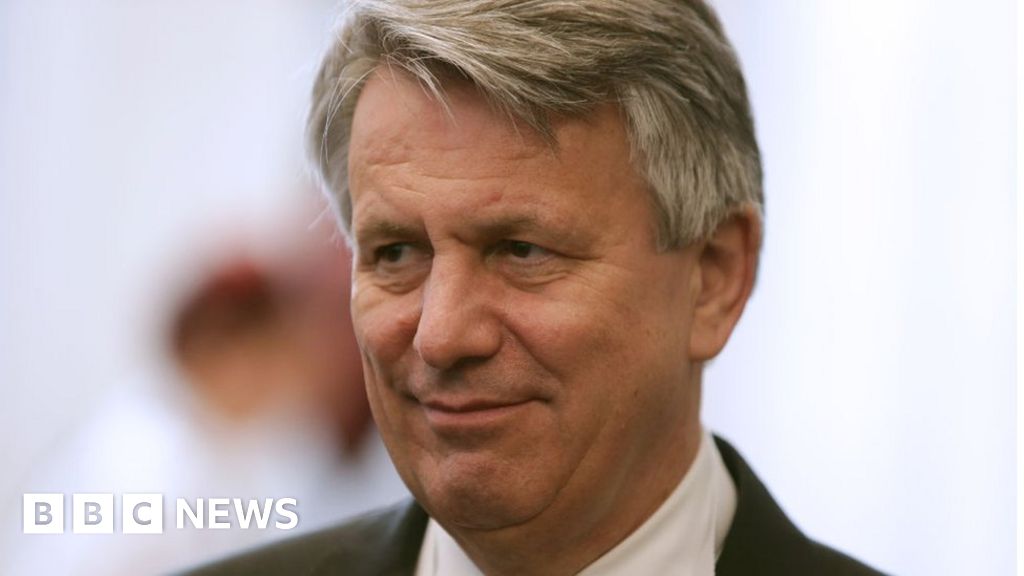Former Shell Boss Ben Van Beurden's Pay Package Jumps To £9.7m

Former Shell boss Ben van Beurden received a pay package of £9.7m last year, up more than 50% from 2021.
His pay was revealed in the oil and gas giant's annual report and accounts.
Shell reported the highest annual profits in its 115-year history last year after a surge in energy prices following Russia's invasion of Ukraine.
Massive profits made by energy firms have added to pressure to tax them more as households struggle with rising energy bills.
Shell made a record $39.9bn (£32.2bn) profit in 2022, double the previous year's total.
When its results came out in February, opposition parties said the company's profits were "outrageous" and that the government was letting energy firms "off the hook" on taxation.
In 2021, Mr van Beurden was paid the equivalent of £6.3m - he was paid in euros because Shell had yet to move its headquarters from the Netherlands to Britain.
He was replaced on 1 January this year by Wael Sawan, the former head of Shell's gas and renewables business.
The annual report said Mr Sawan was appointed on a salary of £1.4m, although performance-related payments can often add to the overall pay package considerably. Mr van Beurden's salary was £1.4m in 2022.
Mr van Beurden's pay package was criticised by human rights and environment charity Global Witness.
"It's a sign of just how broken our energy system is that Shell and other fossil fuel companies have made record-breaking profits from an energy crisis that's forcing families to choose between heating their homes and putting food on the table," said Alice Harrison, fossil fuels campaign leader at Global Witness.
"We're calling on the UK government to implement a people-first windfall tax in next week's Spring Budget, which includes executive bonuses."
Inflation in the UK has been soaring, with huge increases in the cost of energy a key factor.
As prices rise across the board, putting pressure on struggling households, so oil and gas firms have been coming under political pressure.
When he was chancellor, Prime Minister Rishi Sunak brought in a 25% Energy Profits Levy.
This was increased to 35% from January 2023 by current chancellor Jeremy Hunt, and will run until 2028.
The levy applies to profits made from extracting UK oil and gas, but not on refining, or selling petrol and diesel.
Less than 5% of Shell's profits come from UK production.
The scheme was criticised because it allowed oil firms an 80% investment allowance which overall allowed then to claim back 91p in every pound invested, including in oil and gas.
This investment allowance was reduced from 80% to 29% from 1 January.
However, the biggest oil producer in the North Sea, Harbour Energy, has been a vocal critic of the tax.
It said on Thursday that the Energy Profits Levy had "all but wiped out our profit for the year". Harbour reported pre-tax profits of $2.5bn, but tax - including $1.5bn set aside for the levy - had left the company with $8m in post-tax profit.
The tax "has driven us to reduce our UK investment and staffing levels," said its boss Linda Z. Cook, who used to be a Shell executive.
She added that it had given impetus to the firm to expand internationally.
Harbour Energy has not gone ahead at drilling at two sites, and did not take part in the latest North Sea offshore licensing round, a spokesman said.
The planned job cuts are under consultation, the spokesman added.
From Chip War To Cloud War: The Next Frontier In Global Tech Competition
The global chip war, characterized by intense competition among nations and corporations for supremacy in semiconductor ... Read more
The High Stakes Of Tech Regulation: Security Risks And Market Dynamics
The influence of tech giants in the global economy continues to grow, raising crucial questions about how to balance sec... Read more
The Tyranny Of Instagram Interiors: Why It's Time To Break Free From Algorithm-Driven Aesthetics
Instagram has become a dominant force in shaping interior design trends, offering a seemingly endless stream of inspirat... Read more
The Data Crunch In AI: Strategies For Sustainability
Exploring solutions to the imminent exhaustion of internet data for AI training.As the artificial intelligence (AI) indu... Read more
Google Abandons Four-Year Effort To Remove Cookies From Chrome Browser
After four years of dedicated effort, Google has decided to abandon its plan to remove third-party cookies from its Chro... Read more
LinkedIn Embraces AI And Gamification To Drive User Engagement And Revenue
In an effort to tackle slowing revenue growth and enhance user engagement, LinkedIn is turning to artificial intelligenc... Read more

